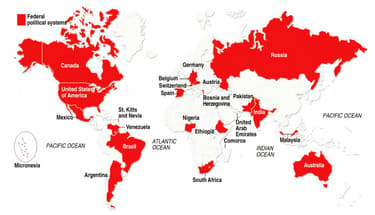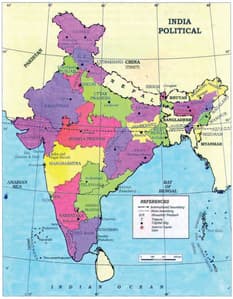Though only of the world's countries have federal political systems, their citizens make up of the world's population. Most of the large countries of the world are federations. Can you notice an exception to this rule in this map?



Important Questions on Federalism
Some Nepalese citizens were discussing the proposals on the adoption of federalism in their new constitution. This is what some of them said:
Khag Raj: I don't like federalism. It would lead to the reservation of seats for different caste groups as in India.
Sarita: Ours is not a very big country. We don't need federalism.
Babu Lal: I am hopeful that the Terai areas will get more autonomy if they get their own state government.
Ram Ganesh: I like federalism because it will mean that powers that were earlier enjoyed by the king will now be exercised by our elected representatives.
A. If you were participating in this conversation what would be your response to each of these?
B. Which of these reflect a wrong understanding of what federalism is?
C. What makes India a federal country?
Pokharan, the place where India conducted its nuclear tests, lies in Rajasthan. Suppose the Government of Rajasthan was opposed to the Central Government's nuclear policy; could it prevent the Government of India from conducting the nuclear tests?
Suppose the Government of Sikkim plans to introduce new textbooks in its schools. But the Union Government does not like the style and content of the new textbooks. In that case, does the state government need to take permission from the Union Government before launching the textbooks?
Suppose the Chief Ministers of Andhra Pradesh, Chhattisgarh and Orissa have different policies on how their state police should respond to Naxalites. Can the Prime Minister of India intervene and pass an order that all the Chief Ministers have to abide by?
Identify the names of three States in that have been changed later.

